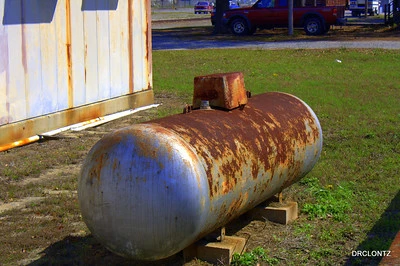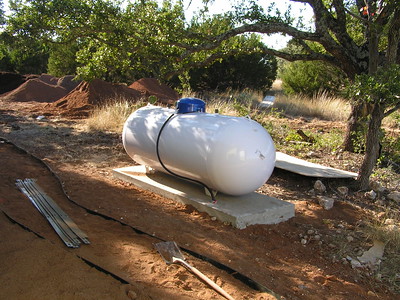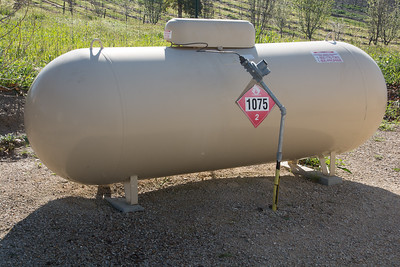
When it comes to propane tanks, many people wonder how long they actually last. A 500-gallon propane tank is a big investment, so it’s important to know if it has an expiration date. In simple terms, yes, these tanks do expire.
On average, a propane tank can continue powering your appliances for more than 30 years. However, the actual lifespan of your tank depends on several factors:
- Above Ground or Underground Tanks:
- Above Ground Tanks: These tanks are exposed to the elements, which means they are more susceptible to weather-related wear and tear, such as rust and corrosion. However, they are easier to inspect and maintain, which can extend their lifespan if properly cared for.
- Underground Tanks: While underground tanks are shielded from direct exposure to the elements, they can still be affected by soil conditions, moisture, and underground water. Proper installation and protection from ground elements are essential to prevent issues like corrosion, which can shorten the tank’s life.
- Temperature and Weather Conditions:
- Extreme Heat or Cold: In areas with harsh winters or scorching summers, temperature fluctuations can cause metal tanks to expand and contract, leading to potential structural issues over time. Freezing temperatures can also affect the components of the tank, such as valves and regulators, potentially leading to malfunctions if not properly maintained.
- Storms and Weather Events: High winds, heavy rain, or hail can physically damage above-ground tanks, while flooding can affect underground tanks by causing them to shift or corrode if the protective coatings are compromised. Regular inspections after severe weather events can help mitigate long-term damage.
- Proper Tank Maintenance:
- Regular Inspections: Routine inspections help identify and address minor issues before they become major problems. For example, checking for rust, leaks, or damaged components can significantly extend the life of your propane tank.
- Preventative Care: Keeping the tank clean, repainting it to protect against rust, and ensuring that all components, such as hoses and valves, are in good working condition are key maintenance practices. Maintenance should also include professional inspections every few years to ensure that the tank meets safety standards and to catch any potential issues early.
- Requalification: As mentioned, after the initial 10 to 12 years, tanks need to be requalified to ensure they are still safe to use. This process can identify any wear and tear that might not be visible during routine maintenance.
By understanding and addressing these factors, you can help ensure that your propane tank remains safe and functional for its full potential lifespan.
Understanding Propane Tank Expiration
When we say a propane tank “expires,” it simply means that the tank has reached the end of its safe and reliable usage period. For a 500-gallon propane tank, this usually happens around 30 years after the tank was made. After this time, the tank needs to be inspected and requalified to ensure it’s still safe to use.
The reason propane tanks have a limited lifespan is due to factors like material wear and tear over time. The metal can weaken, and other components can start to degrade, which can make the tank unsafe. Safety standards are in place to ensure that old tanks are either requalified or taken out of service to prevent accidents. So, while a tank can last for decades with proper care, it’s important to pay attention to these time frames to keep things safe.
Additionally, the environment where the tank is located can also affect its lifespan. For example, tanks that are exposed to harsh weather conditions or extreme temperatures may experience faster degradation. Above-ground tanks might be more prone to rust and corrosion, while underground tanks could be impacted by soil conditions and moisture.
That’s why regular inspections and maintenance are crucial. Checking your tank for signs of wear, such as rust or leaks, and ensuring that all parts are in good working order can help extend its life.
Why Expiration Matters
Using an expired propane tank can be dangerous. As a tank gets older, the metal and other parts can weaken, which increases the risk of leaks or even explosions. An expired tank may no longer be able to safely hold the pressure of the propane inside, which can lead to serious accidents.
If you ignore the expiration date and continue using a tank that’s over 30 years old, you’re taking a big risk. Not only could it fail, but it may also cause property damage, injury, or even worse. Plus, insurance may not cover any damages caused by an old, expired tank, leaving you to deal with the financial consequences on your own.
On top of the safety concerns, there are legal regulations in place that require propane tanks to be inspected and requalified after a certain number of years. If your tank isn’t up to code, you could face fines or penalties. In some places, it’s illegal to fill a tank that hasn’t been requalified, so you might not even be able to get it refilled if it’s expired.
In short, keeping track of your propane tank’s expiration date and getting it inspected when needed isn’t just about following the rules—it’s about keeping you and your property safe.
Time to Replace It If It Is Over 30 Years Old
If your propane tank is over 30 years old, it’s likely time to replace it. While propane tanks can be requalified and extended for additional years, a tank that has reached or exceeded 30 years of age may no longer be safe or reliable, even with inspections. After decades of use, the metal can become more prone to corrosion, the valves and fittings may wear out, and the overall structural integrity of the tank can weaken.
At this stage, reinspection may no longer be enough to ensure the tank’s safety. Instead of risking potential failures, it’s often better to invest in a new tank. This way, you can ensure you’re meeting current safety standards and regulations while also avoiding the potential dangers of using a tank that’s well past its prime.
Replacing an old tank not only gives you peace of mind but can also improve efficiency and safety for your propane system. Newer tanks are designed to meet stricter safety regulations and may include modern features that older tanks don’t have. If your tank is over 30 years old, it’s a good idea to consult a propane professional about replacement options to keep everything running smoothly and safely.
Which One Lasts Longer – Underground or Above-Ground 500-gallon Propane Tank?
When deciding between an underground or above-ground 500-gallon propane tank, it’s important to understand how each type lasts over time. Let’s break down the key factors that affect the lifespan of each:
- Above-Ground Tanks:
- Lifespan: With proper care, an above-ground propane tank can last 30 years or more. However, because it sits out in the open, it’s more vulnerable to weather conditions. Rain, snow, and even sunlight can cause rust, corrosion, and damage to the tank over time.
- Maintenance: To help your above-ground tank last longer, regular maintenance is essential. This includes checking for rust spots, repainting the tank when needed, and making sure all valves and connections are in good shape. Inspections should be done annually to catch any issues early.
- Pros: Easier to access for inspections and repairs, and typically less expensive to install than underground tanks.
- Cons: More exposed to the elements, which can lead to faster wear and tear if not properly maintained.
- Underground Tanks:
- Lifespan: Underground tanks are designed to be more durable against environmental factors. They often have special coatings to protect against moisture and corrosion, which can help them last over 30 years. However, the soil conditions and underground water levels where the tank is buried can impact its lifespan.
- Maintenance: Even though they’re buried, underground tanks still need regular maintenance. Inspections are recommended every 3 to 5 years to ensure the protective coating is intact and there are no leaks. A cathodic protection system, which prevents corrosion, may also need periodic checking.
- Pros: Protected from weather, hidden from view, and less likely to suffer from temperature extremes.
- Cons: More difficult and expensive to inspect, maintain, and replace if needed. Potential issues with corrosion if not installed or maintained correctly.
Which One Lasts Longer?
In general, both types of tanks can last over 30 years with proper care, but each has its challenges:
- Above-ground tanks are more exposed to the elements but are easier to monitor and maintain.
- Underground tanks are protected from the weather but require more careful installation and periodic checks to prevent corrosion.
Ultimately, the lifespan of either tank depends on factors like maintenance, installation quality, and environmental conditions. Regular inspections and upkeep are key to maximizing the life of both underground and above-ground propane tanks.
To Conclude This
While 500-gallon propane tanks do have a limited lifespan, they can last for many years—often over 30 years—if properly maintained. Understanding when your tank is due for requalification or replacement is crucial for safety and compliance with regulations.
Regular inspections and upkeep can help extend the life of your tank, whether it’s above-ground or underground. By paying attention to expiration dates and taking the necessary steps to care for your tank, you can ensure that it continues to serve you safely and reliably for as long as possible.
Image source: Dr Clontz (Flickr)

Mike is an experienced propane technician with over 15 years of professional experience in the field. He has dedicated his career to helping customers with their propane needs, from installation to maintenance and repair. Together with Jeremy, he co-founded this website to provide useful information and guidance to customers seeking reliable propane services.







